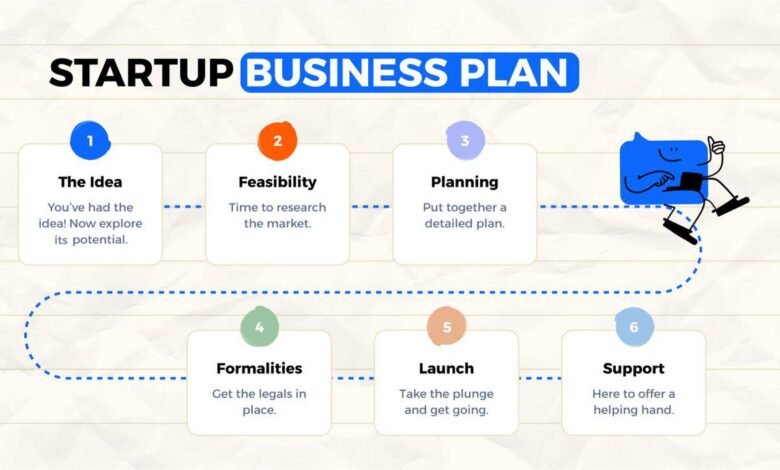The Power of a Business Plan for Startups

Starting a business is exciting but it can also feel like navigating a maze with no map. From product development and team building to marketing and funding, the journey is filled with uncertainty. That’s why one of the most powerful tools you can create early on is a business plan.
A well-written business plan helps you gain clarity, attract funding, align your team, and make better decisions. It transforms your idea from a concept into a roadmap that can guide your actions and measure your progress.
In this article, we explore the power of a business plan for startups, why it’s essential, and how it sets you up for long-term success.
Why a Business Plan Is Essential for Startups
A business plan isn’t just a document you show investors—it’s a blueprint that defines your strategy and direction. It forces you to think critically about your business model, market, and financial structure.
1. Clarifies Your Vision
When you start a business, you may have a general idea of what you want to achieve. A business plan challenges you to turn that idea into a structured vision with actionable goals. It outlines your mission, product or service offering, and target market in clear, measurable terms.
2. Attracts Investors and Lenders
Investors want to know they’re putting their money into something viable. A business plan shows that you’ve done your homework—it includes data-driven market analysis, a well-thought-out marketing strategy, financial forecasts, and a clear growth plan. Without this, it’s difficult to build investor confidence or secure funding.
3. Acts as a Decision-Making Tool
A business plan helps guide your decision-making by keeping your strategy front and center. Whether you’re considering hiring staff, launching a new product, or entering a new market, the plan serves as a reference point to help you weigh risks and benefits.
4. Keeps Your Team Aligned
A business plan communicates your mission, values, and goals to your team, supporting strategic decision-making at every level. It defines roles, outlines expectations, and fosters alignment across departments. Everyone knows what they’re working toward and how their contributions support the bigger picture
Key Components of a Startup Business Plan
While each business is different, most effective startup business plans contain the following sections:
Executive Summary
This is a snapshot of your entire business plan. It includes your mission statement, product or service, target market, and a brief summary of financials.
Company Overview
This section explains your business model, legal structure, location, and the problems you aim to solve.
Market Analysis
Covers research on your industry, customer segments, competitors, and trends. It shows that your idea is based on real demand not assumptions.
Organization and Management
Outlines your team, leadership structure, and the skills each member brings to the table.
Product or Service Line
Details your offerings, what sets them apart, and how they solve problems for your customers.
Marketing and Sales Strategy
Explains how you plan to attract, engage, and retain customers. Includes pricing, promotion, and sales tactics.
Financial Projections
Includes income statements, balance sheets, cash flow statements, and break-even analysis for the next 3–5 years.
Funding Request (if applicable)
States how much capital you need, how it will be used, and the proposed return on investment.
Read Also: Top Business Coaching Tips for Entrepreneurs
How a Business Plan Supports Long-Term Growth
As your startup evolves, your business plan should evolve with it. It’s not a one-time document, it’s a living strategy.
Early-Stage Startups
At this stage, your plan validates your idea. It helps you assess market demand, potential revenue, and costs.
Growth Phase
Once you have traction, your business plan helps you manage growth, forecast cash flow, and set hiring or expansion targets.
Scaling Phase
If you’re scaling, the plan becomes critical for forming strategic partnerships, entering new markets, or preparing for mergers and acquisitions.
Avoid These Common Mistakes
A business plan is only as useful as it is accurate and realistic. Watch out for these pitfalls:
- Overly optimistic projections
Avoid inflating revenue forecasts or downplaying expenses. - Lack of market validation
Base your assumptions on real research and customer feedback. - Generic templates
Your business is unique, your plan should reflect that. A generic plan won’t impress investors or guide your internal team.
Writing Your Plan: DIY or Professional Help?
Some founders choose to write their own business plans, especially in the early stages. However, writing a strong plan takes time, research, and a deep understanding of what investors and lenders are looking for. If you’re seeking outside funding or want to ensure your plan is professionally structured and persuasive, consider hiring expert help.
Companies like www.custombusinessplanwriters.com specialize in creating tailored, investor-ready business plans. They combine industry insight, financial expertise, and persuasive writing to craft plans that win funding and drive results.
Final Thoughts
A business plan isn’t just paperwork; it’s the foundation of your startup. It helps you turn your vision into action, prepare for challenges, and stay on track toward your goals.
Whether you’re launching a tech startup, opening a local shop, or scaling a growing brand, a business plan gives you the structure, confidence, and clarity you need to succeed. Start with a strong foundation, your future depends on it.







